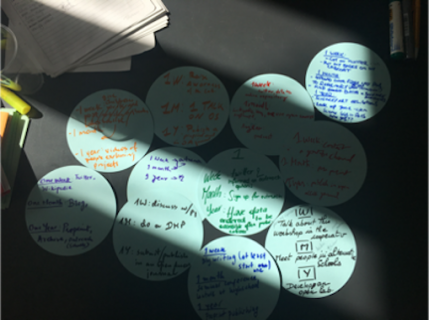In 2018, as a part of the ORION Open Science project, the Max Delbrück Center for Molecular Medicine in the Helmholtz Association, MDC, held pilot training workshops on Open Science and Responsible Research and Innovation. The pilots were to form the basis of an ambitious schedule of workshops run during the ORION project as well as inform the Massive Open Online Course (MOOC) on Open Science for the Life Sciences, that remains available after the end of ORION.
A hallmark of a good workshop is two-way dialogue with participants. It’s important that people are given time to feedback and reflect on what they have learned. During the first workshop held by the team at MDC, participants were asked to write down an individual action plan on how they were going to practically engage with Open Science going forward. The question specified different time scales, so participants had to outline what they would do right now, what they would do in one month and what they would do in a year.
The seminar room went quiet as the participants stared intently at the post-it notes in front of them. It was at this moment that the workshop organisers wondered if perhaps the exercise was a little too difficult. After only one workshop, it occurred to them that the exercise might be premature and may take more time than was allocated. The organisers waited for the exercise to finish with a little apprehension. However, to their surprise, as participants stood to put their ideas on the board, the organisers’ apprehension vanished. It seemed that everyone had come up with a vast array of different ideas on how they could implement Open Science. While there was some overlap in the general principles that overlapped with the content of the workshop, each suggestion was completely personalised to the person who wrote it, making it much more meaningful and actionable.
People expressed that they would become advocates for Open Science, that they would make their data open and only publish in Open Access journals. Many also expressed the desire to become better informed about the topic and to learn more about how their institutions could engage with Open Science. It was surprising how easily this seemed to come to the participants. The experience was repeated in every workshop that the team organised. Every suggestion that was brought forwards was relevant and easy to accomplish for the person who suggested it.
This makes sense in hindsight. Change comes when you allow people the time to reflect and find their own position, even for a brief period. It’s when people can align new information with their own core beliefs and take ownership. This reflection, coupled with the requirement in the exercise to concisely articulate actions proved to be a winning formula. The team saw that their training was working. While it remains to be tested if the participants followed up on their individual actions, the exercise surely reduced barriers to adopting Open Science principles in their own lives.
This is an example of the power of dedicating time for reflection in training. With even a short amount of time, it is possible to take general information and make it extremely concrete and relevant to the lives of the participants of a training session, thereby empowering them to take positive individual action based upon their own knowledge and learning.
More information
Please get in touch with Luiza Bengtsson at Max Delbrück Center for Molecular Medicine if you would like to know more about the Open Science workshops. All training materials developed under the ORION project are freely available for anyone to use.
